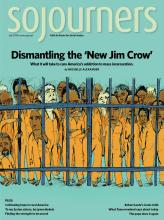THE CHILDHOOD UNDERSTANDING of the familiar tune about climbing Jacob’s ladder needs a reset. The Genesis narratives aren’t just about heaven—they yield epiphanies into the ordinary life of faith. The household of Abraham and Sarah, even in its ancient context, is atypical. In family dynamics, without the miraculous moments, epiphanies subvert our expectations of whom and what God can utilize to reveal the faithfulness of divine promises. Sometimes the testimony is evident in ordinary lives—even ours. You’ve heard it said, “Our greatest weakness is our strength.” The episodes in Jacob’s life provide sufficient demonstrations of how passions both energize and blind us: Passion or anger; leadership or arrogance; emotion or intuition; determination or stubbornness.
Despite Jacob’s inconsistencies, the second half of Genesis encompasses his story, as the son of Isaac, grandson of Abraham. Here we find an unfolding drama. Characters display human nature at its extremes: conniving relatives, loving couples; creative entrepreneurs, dishonest contractors. All, somehow, used by God to form a people with whom the Spirit so evidently abides.
Even when we go our own way, God’s purposes are not thwarted. The challenge for the church in this Pentecost season is to trust that God is planting seeds in good soil—and the seeds that won’t sprout also have a purpose in this garden. Remember that the actions of justice, grace, and faithfulness we practice at home are as much a witness to God as our public proclamations and protests.
Read the Full Article

